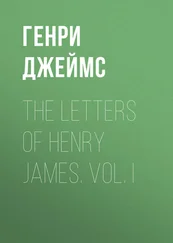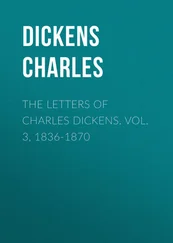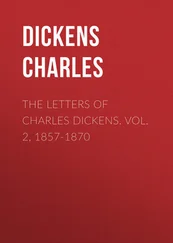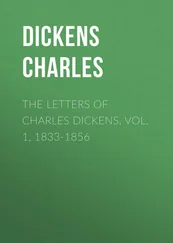William James - The Letters of William James, Vol. 1
Здесь есть возможность читать онлайн «William James - The Letters of William James, Vol. 1» — ознакомительный отрывок электронной книги совершенно бесплатно, а после прочтения отрывка купить полную версию. В некоторых случаях можно слушать аудио, скачать через торрент в формате fb2 и присутствует краткое содержание. Жанр: Биографии и Мемуары, Философия, foreign_edu, foreign_antique, на английском языке. Описание произведения, (предисловие) а так же отзывы посетителей доступны на портале библиотеки ЛибКат.
- Название:The Letters of William James, Vol. 1
- Автор:
- Жанр:
- Год:неизвестен
- ISBN:нет данных
- Рейтинг книги:5 / 5. Голосов: 1
-
Избранное:Добавить в избранное
- Отзывы:
-
Ваша оценка:
- 100
- 1
- 2
- 3
- 4
- 5
The Letters of William James, Vol. 1: краткое содержание, описание и аннотация
Предлагаем к чтению аннотацию, описание, краткое содержание или предисловие (зависит от того, что написал сам автор книги «The Letters of William James, Vol. 1»). Если вы не нашли необходимую информацию о книге — напишите в комментариях, мы постараемся отыскать её.
The Letters of William James, Vol. 1 — читать онлайн ознакомительный отрывок
Ниже представлен текст книги, разбитый по страницам. Система сохранения места последней прочитанной страницы, позволяет с удобством читать онлайн бесплатно книгу «The Letters of William James, Vol. 1», без необходимости каждый раз заново искать на чём Вы остановились. Поставьте закладку, и сможете в любой момент перейти на страницу, на которой закончили чтение.
Интервал:
Закладка:
During the three or four years that followed his marriage Henry James, Senior, appears to have spent his time in Albany and New York. In the latter city, in the old, or then new, Astor House, his eldest son was born on the eleventh of January, 1842. He named the boy William, and a few days later brought his friend R. W. Emerson to admire and give his blessing to the little philosopher-to-be. 6 6 A Small Boy and Others , p. 8.
Shortly afterwards the family moved into a house at No. 2 Washington Place, and there, on April 15, 1843, the second son, Henry, came into the world. There was thus a difference of fifteen months in the ages of William and the younger brother, who was also to become famous and who figures largely in the correspondence that follows.
William James derived so much from his father and resembled him so strikingly in many ways that it is worth while to dwell a little longer on the character, manners, and beliefs of the elder Henry James. He was not only an impressive and all-pervading presence in the early lives of his children, but always continued to be for them the most vivid and interesting personality who had crossed the horizon of their experience. He was their constant companion, and entered into their interests and poured out his own ideas and emotions before them in a way that would not have been possible to a nature less spontaneous and affectionate.
His books, written in a style which "to its great dignity of cadence and full and homely vocabulary, united a sort of inward palpitating human quality, gracious and tender, precise, fierce, scornful, humorous by turns, recalling the rich vascular temperament of the old English masters rather than that of an American of today," 7 7 Literary Remains of Henry James , Introduction, p. 9.
reveal him richly to anyone who has a taste for theological reading. His philosophy is summarized in the introduction to "The Literary Remains," and his own personality and the very atmosphere of his household are reproduced in "A Small Boy and Others," and "Notes of a Son and Brother." Thus what it is appropriate to say about him in this place can be given largely in either his own words or those of one or the other of his two elder sons.
The intellectual quandary in which Henry James, Senior, found himself in early manhood was well described in letters to Emerson in 1842 and 1843. "Here I am," he wrote, "these thirty-two years in life, ignorant in all outward science, but having patient habits of meditation, which never know disgust or weariness, and feeling a force of impulsive love toward all humanity which will not let me rest wholly mute, a force which grows against all resistance that I can muster against it. What shall I do? Shall I get me a little nook in the country and communicate with my living kind—not my talking kind—by life only; a word perhaps of that communication, a fit word once a year? Or shall I follow some commoner method—learn science and bring myself first into man's respect, that I may thus the better speak to him? I confess this last theory seems rank with earthliness—to belong to days forever past.... I am led, quite without any conscious wilfulness either, to seek the laws of these appearances that swim round us in God's great museum—to get hold of some central facts which may make all other facts properly circumferential, and orderly so—and you continually dishearten me by your apparent indifference to such law and central facts, by the dishonor you seem to cast on our intelligence, as if it stood much in our way. Now my conviction is that my intelligence is the necessary digestive apparatus for my life; that there is nihil in vita —worth anything, that is— quod non prius in intellectu .... Oh, you man without a handle! Shall one never be able to help himself out of you, according to his needs, and be dependent only upon your fitful tippings-up?" 8 8 See, further, Notes of a Son and Brother , pp. 181 et seq.
To a modern ear these words confess not only the mental isolation and bewilderment of their author, but also the rarity of the atmosphere in which his philosophic impulse was struggling to draw breath. Like many other struggling spirits of his time, he fell into a void between two epochs. He was a theologian too late to repose on the dogmas and beliefs that were accepted by the preceding generation and by the less critical multitude of his own contemporaries. He was, in youth, a skeptic—too early to avail himself of the methods, discoveries, and perspectives which a generation of scientific inquiry conferred upon his children. The situation was one which usually resolved itself either into permanent skepticism or a more or less unreasoning conformity. In the case of Henry James there happened ere long one of those typical spiritual crises in which "man's original optimism and self-satisfaction get leveled with the dust." 9 9 Society of the Redeemed Form of Man , quoted in the Introduction to Literary Remains , p. 57, et seq.
While he was still struggling out of his melancholy state a friend introduced him to the works of Swedenborg. By their help he found the relief he needed, and a faith that possessed him ever after with the intensity of revelation.
"The world of his thought had a few elements and no others ever troubled him. Those elements were very deep ones and had theological names." So wrote his son after he had died. 10 10 Letter to Shadworth H. Hodgson, p. 241 infra .
He never achieved a truly philosophic formulation of his religious position, and Mr. Howells once complained that he had written a book about the "Secret of Swedenborg" and had kept it . He concerned himself with but one question, conveyed but one message; and the only business of his later life was the formulation and serene reutterance, in books, occasional lectures, and personal correspondence, of his own conception of God and of man's proper relation to him. "The usual problem is—given the creation to find the Creator. To Mr. James it [was]—given the Creator to find the creation. God is; of His being there is no doubt; but who and what are we?" So said a critic quoted in the Introduction to the "Literary Remains," and William James's own estimate may be quoted from the same place (page 12). "I have often," he wrote "tried to imagine what sort of a figure my father might have made, had he been born in a genuinely theological age, with the best minds about him fermenting with the mystery of the Divinity, and the air full of definitions and theories and counter-theories, and strenuous reasoning and contentions, about God's relation to mankind. Floated on such a congenial tide, furthered by sympathetic comrades, and opposed no longer by blank silence but by passionate and definite resistance, he would infallibly have developed his resources in many ways which, as it was, he never tried; and he would have played a prominent, perhaps a momentous and critical, part in the struggles of his time, for he was a religious prophet and genius, if ever prophet and genius there were. He published an intensely positive, radical, and fresh conception of God, and an intensely vital view of our connection with him. And nothing shows better the altogether lifeless and unintellectual character of the professional theism of our time, than the fact that this view, this conception, so vigorously thrown down, should not have stirred the faintest tremulation on its stagnant pool."
The reader will readily infer that there was nothing conventional, prim, or parson-like about this man. The fact is that the devoutly religious mind is often quite anarchic in its disregard of all those worldly institutions and conventions which do not express human dependence on the Creator. Henry James, Senior, dealt with such things in the most allusive and paradoxical terms. "I would rather," he once ejaculated, "have a son of mine corroded with all the sins of the Decalogue than have him perfect!" His prime horror, writes Henry James, was of prigs; "he only cared for virtue that was more or less ashamed of itself; and nothing could have been of a happier whimsicality than the mixture in him, and in all his walk and conversation, of the strongest instinct for the human and the liveliest reaction from the literal. The literal played in our education as small a part as it perhaps ever played in any, and we wholesomely breathed inconsistency and ate and drank contradictions.... The moral of all was that we need never fear not to be good enough if we were only social enough; a splendid meaning indeed being attached to the latter term. Thus we had ever the amusement, since I can really call it nothing less, of hearing morality, or moralism, as it was more invidiously worded, made hay of in the very interest of character and conduct; these things suffering much, it seemed, by their association with conscience—the very home of the literal, the haunt of so many pedantries." 11 11 A Small Boy and Others , p. 216.
Интервал:
Закладка:
Похожие книги на «The Letters of William James, Vol. 1»
Представляем Вашему вниманию похожие книги на «The Letters of William James, Vol. 1» списком для выбора. Мы отобрали схожую по названию и смыслу литературу в надежде предоставить читателям больше вариантов отыскать новые, интересные, ещё непрочитанные произведения.
Обсуждение, отзывы о книге «The Letters of William James, Vol. 1» и просто собственные мнения читателей. Оставьте ваши комментарии, напишите, что Вы думаете о произведении, его смысле или главных героях. Укажите что конкретно понравилось, а что нет, и почему Вы так считаете.












